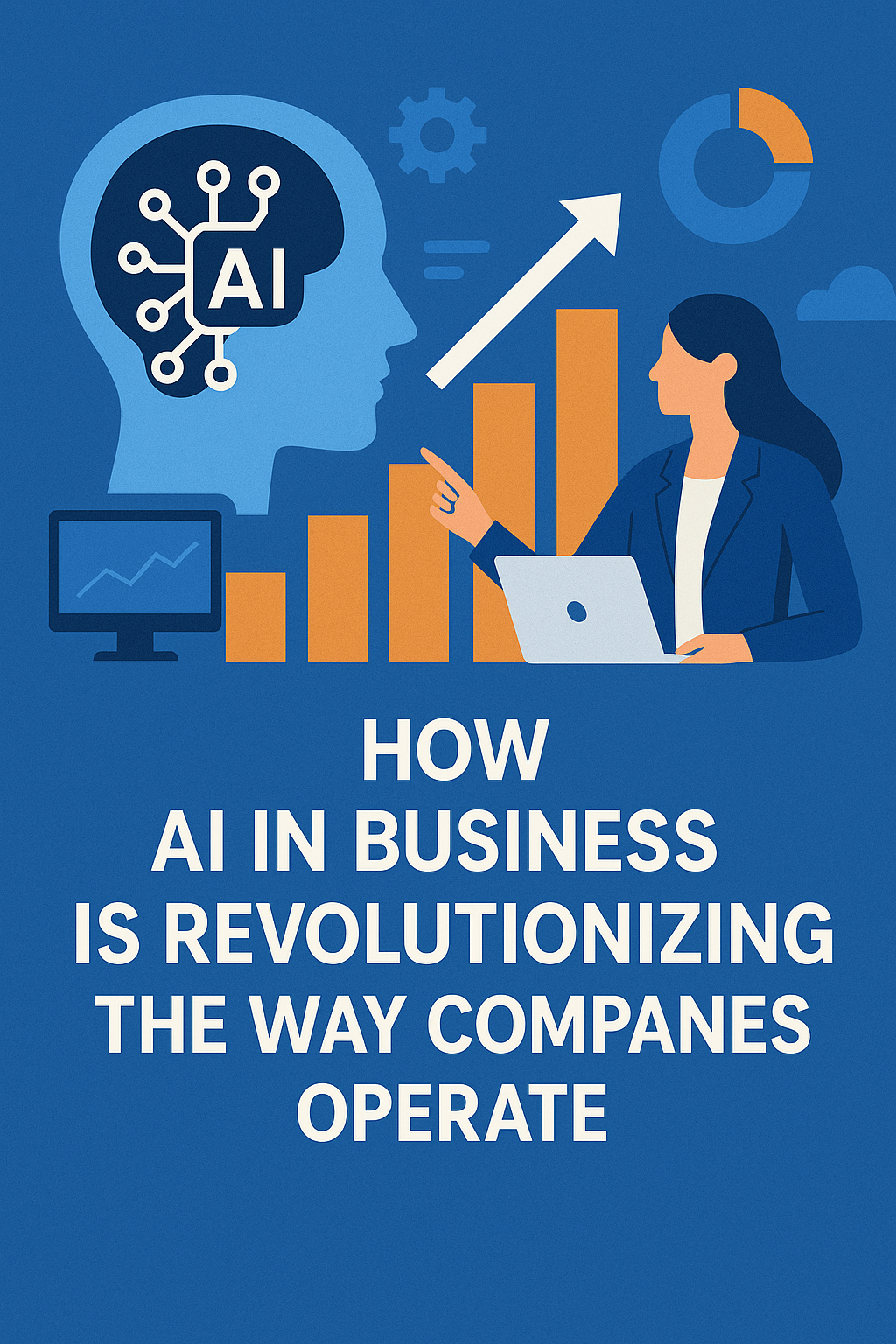In today’s rapidly evolving business landscape, staying ahead of the curve is more crucial than ever, and AI in business is proving to be a game-changer. As companies continuously seek innovative ways to enhance operations and drive growth, the benefits of AI are becoming increasingly apparent.
From streamlining processes and improving decision-making to boosting customer experiences, artificial intelligence for companies offers a suite of transformative tools.
By harnessing AI technology, businesses can unlock new levels of efficiency and agility that were previously unimaginable.
In this blog post, we delve into how AI solutions for businesses are not only revolutionizing operations but also setting new standards in competitive advantage and market leadership.
Understanding AI in Business
AI in business is transforming how companies operate, make decisions, and interact with customers. This section explores the fundamentals of AI technology, its key benefits, and how it’s being applied in various industries.
What is AI Technology?
Artificial Intelligence (AI) technology refers to computer systems designed to perform tasks that typically require human intelligence. These systems can learn, reason, and self-correct, mimicking cognitive functions associated with the human mind.
AI encompasses various subfields, including machine learning, natural language processing, and computer vision. These technologies enable computers to analyze vast amounts of data, recognize patterns, and make predictions or decisions based on that analysis.
In the business context, AI technology is being integrated into a wide range of applications, from customer service chatbots to predictive analytics tools. Its ability to process and interpret complex data sets at high speeds makes it an invaluable asset for modern enterprises.

Key Benefits of AI
AI offers numerous advantages to businesses, enhancing operations across various departments. Here are some key benefits:
-
Increased Efficiency: AI automates repetitive tasks, freeing up human resources for more strategic work.
-
Improved Decision-Making: AI analyzes vast amounts of data to provide insights for better, data-driven decisions.
-
Enhanced Customer Experience: AI-powered chatbots and personalization engines improve customer interactions.
Moreover, AI contributes to:
-
Cost reduction through process optimization
-
Improved accuracy in predictions and forecasting
-
24/7 operational capability without fatigue
A McKinsey study found that AI could potentially deliver additional economic output of around $13 trillion by 2030, increasing global GDP by about 1.2 percent annually.
Artificial Intelligence for Companies
Artificial Intelligence for companies comes in various forms, tailored to specific industry needs and business objectives. From small startups to large corporations, businesses are leveraging AI to gain competitive advantages.
For instance, in the retail sector, AI is used for inventory management and personalized product recommendations. In healthcare, AI assists in diagnostic processes and drug discovery. Financial institutions use AI for fraud detection and risk assessment.
The key to successful AI implementation lies in identifying the right use cases that align with business goals and can deliver tangible value. Companies must also consider factors such as data availability, technical infrastructure, and workforce skills when adopting AI solutions.
AI Solutions for Businesses
AI solutions are revolutionizing business operations across industries. This section explores how AI enhances efficiency, transforms customer experiences, and streamlines decision-making processes.
Enhancing Operational Efficiency
AI significantly boosts operational efficiency by automating routine tasks and optimizing complex processes. Machine learning algorithms can analyze production data to predict maintenance needs, reducing downtime and extending equipment life.
In supply chain management, AI optimizes inventory levels and logistics routes, leading to cost savings and improved delivery times. For example, Amazon uses AI to predict product demand and optimize warehouse operations.
Moreover, AI-powered robotic process automation (RPA) can handle repetitive administrative tasks, freeing up employees to focus on higher-value activities. This not only increases productivity but also reduces errors and improves overall operational quality.
Transforming Customer Experience
AI is reshaping how businesses interact with customers, offering personalized experiences at scale. Natural Language Processing (NLP) powers chatbots and virtual assistants, providing 24/7 customer support and reducing response times.
Recommendation engines, driven by machine learning, analyze customer behavior to suggest relevant products or content. Netflix, for instance, uses AI to personalize movie recommendations, significantly improving user engagement.
Additionally, AI enables predictive customer service, anticipating issues before they arise. This proactive approach not only enhances customer satisfaction but also reduces support costs and increases customer loyalty.
Streamlining Decision-Making Processes
AI empowers businesses to make data-driven decisions faster and more accurately. Advanced analytics and machine learning algorithms can process vast amounts of data to identify trends, patterns, and insights that might be missed by human analysts.
In financial services, AI assists in risk assessment and fraud detection, analyzing transaction patterns to flag suspicious activities in real-time. Marketing teams use AI to optimize campaign performance, predicting customer responses and adjusting strategies accordingly.
Furthermore, AI-powered predictive analytics help businesses forecast market trends, customer behavior, and potential risks, enabling proactive decision-making and strategic planning.
Future of AI in Business
As AI continues to evolve, its impact on business is set to grow exponentially. This section explores emerging trends, preparation strategies for AI integration, and important considerations for the future.
Emerging Trends and Innovations
The future of AI in business is marked by exciting innovations and trends that promise to further revolutionize operations. Explainable AI (XAI) is gaining traction, making AI decision-making processes more transparent and interpretable.
Edge AI is another emerging trend, bringing AI capabilities closer to data sources, enabling faster processing and reduced latency. This is particularly crucial for IoT applications and real-time decision-making scenarios.
We’re also seeing advancements in:
-
AI-powered autonomous systems
-
More sophisticated natural language processing
-
AI in quantum computing applications
These innovations are set to open new possibilities for businesses across various sectors, from manufacturing to healthcare and beyond.
Preparing for AI Integration
To successfully integrate AI, businesses need to take a strategic approach. Here are key steps:
-
Assess current capabilities and identify potential AI use cases
-
Invest in data infrastructure and quality
-
Develop AI literacy across the organization
-
Start with pilot projects and scale gradually
-
Foster a culture of innovation and continuous learning
It’s crucial to align AI initiatives with overall business objectives and to involve stakeholders from various departments in the integration process. This ensures that AI solutions address real business needs and gain widespread adoption within the organization.
Challenges and Considerations
While AI offers immense potential, it also comes with challenges that businesses must address:
-
Data Privacy and Security: As AI systems rely on vast amounts of data, ensuring data privacy and security is paramount.
-
Ethical Considerations: Businesses must navigate the ethical implications of AI, including bias in AI decision-making and job displacement concerns.
-
Skills Gap: There’s a growing need for AI expertise, which can be challenging to find and retain.
Moreover, regulatory compliance, particularly around AI use and data handling, is becoming increasingly complex. Businesses must stay informed about evolving regulations and ensure their AI implementations comply with legal requirements.
“The biggest challenge of making the evolution into an AI-assisted organization is not the technology. It’s the cultural transformation that has to happen in the company.” – Fei-Fei Li, Professor of Computer Science at Stanford University
To address these challenges, businesses should:
-
Implement robust data governance frameworks
-
Invest in ongoing employee training and development
-
Engage in responsible AI practices and ethical guidelines
-
Stay informed about AI regulations and best practices
By proactively addressing these considerations, businesses can harness the full potential of AI while mitigating associated risks.




